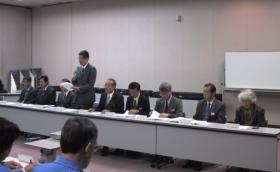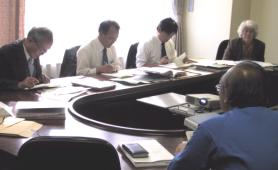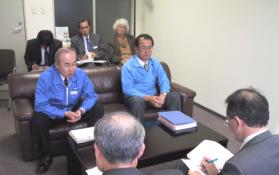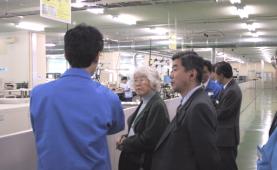|
|
 |
 During the period from November
20 to 22, 2002, the 27th peer review was carried out at the Tokyo Site,
Fuji Electric Co., Ltd. (Hino-shi, Tokyo.). In the peer review, Ms. Yuki
Aomi, Advisory Specialist for Consumers' Affairs, participated as an observer,
a lifestyle information critic from outside NSnet membership, participated
as an observer over a period of two days. We would like to introduce her
opinions and impressions, which we have compiled as below. During the period from November
20 to 22, 2002, the 27th peer review was carried out at the Tokyo Site,
Fuji Electric Co., Ltd. (Hino-shi, Tokyo.). In the peer review, Ms. Yuki
Aomi, Advisory Specialist for Consumers' Affairs, participated as an observer,
a lifestyle information critic from outside NSnet membership, participated
as an observer over a period of two days. We would like to introduce her
opinions and impressions, which we have compiled as below.
 The purport of introducing
the observer this time and the contents of the observer evaluation (perspectives)
have been indicated separately. The purport of introducing
the observer this time and the contents of the observer evaluation (perspectives)
have been indicated separately.
|
1. Introduction |
 I am an Advisory Specialist
for Consumers' Affairs. With a government-certified qualification from
the Ministry of Economy, Trade and Industry, consumer lifestyle advisors
have the role of being a pipeline between companies and consumers, between
government and citizens, and between experts and laypersons. Therefore,
my position is as a specialist, but not an expert. I am an Advisory Specialist
for Consumers' Affairs. With a government-certified qualification from
the Ministry of Economy, Trade and Industry, consumer lifestyle advisors
have the role of being a pipeline between companies and consumers, between
government and citizens, and between experts and laypersons. Therefore,
my position is as a specialist, but not an expert.
|
2. Impressions regarding this peer review |

Observer confirming openings
(right side)
|
 The plant was extremely clean with a good environment. I am very thankful that it proved to be a very fruitful as well as meaningful participation. The plant was extremely clean with a good environment. I am very thankful that it proved to be a very fruitful as well as meaningful participation.
(1) Concerning Opening
 The opening could have been a little shorter and simpler. Of course, since the contents of the review differ from group to group, I think some sort of initial introduction is necessary. Having such ceremonies also with the group review is repetitive. For the opening of this review, I think it would have been enough to have everyone meet each other to exchange simple greetings. The opening could have been a little shorter and simpler. Of course, since the contents of the review differ from group to group, I think some sort of initial introduction is necessary. Having such ceremonies also with the group review is repetitive. For the opening of this review, I think it would have been enough to have everyone meet each other to exchange simple greetings.
|

Observer confirming situation of document examination (far right)
|
(2) Concerning document examination
 I thought that we had some rather fruitful discussions during the document examination.Concerning product safety, while I had some reservations about how Fuji Electric is making use of feedback on consumer needs and satisfaction levels, I thought that part was extremely effective, leaving the strongest impression. With regard to man-machine interface, it is sometimes difficult for the designers and those who install the machines and equipments to fully understand and predict how those machines are to be utilized. In other words, there are times when people are also concerned about how easy a machine is to use, how a display looks, and in case of larger instruments, then the design, color and other such features would have to be taken into consideration. I thought that we had some rather fruitful discussions during the document examination.Concerning product safety, while I had some reservations about how Fuji Electric is making use of feedback on consumer needs and satisfaction levels, I thought that part was extremely effective, leaving the strongest impression. With regard to man-machine interface, it is sometimes difficult for the designers and those who install the machines and equipments to fully understand and predict how those machines are to be utilized. In other words, there are times when people are also concerned about how easy a machine is to use, how a display looks, and in case of larger instruments, then the design, color and other such features would have to be taken into consideration.
 For facilities that have that kind of equipment installed, I've often felt the needs of users should be respected a little more. I think to what extent feedback is implemented is very important. Developing full knowledge of users' needs is always important, crucially so when something unexpected should occur. As an observer I felt that it is very important to systematically implement feedback on the needs and satisfaction levels of two different customers(those who make the equipments and those who utilize them.) For facilities that have that kind of equipment installed, I've often felt the needs of users should be respected a little more. I think to what extent feedback is implemented is very important. Developing full knowledge of users' needs is always important, crucially so when something unexpected should occur. As an observer I felt that it is very important to systematically implement feedback on the needs and satisfaction levels of two different customers(those who make the equipments and those who utilize them.)
 Another thing I wanted to point out. The document examination was explained using computers, but I thought there were times when they could have been used more effectively. I thought it would have been better if they combined PowerPoint with the explanation of the documents. There were some technical problems with the review process, such as it being difficult to check documents given the preparation of documents and setting of the meeting place. I think the use of a bit more creativity would have been better. Another thing I wanted to point out. The document examination was explained using computers, but I thought there were times when they could have been used more effectively. I thought it would have been better if they combined PowerPoint with the explanation of the documents. There were some technical problems with the review process, such as it being difficult to check documents given the preparation of documents and setting of the meeting place. I think the use of a bit more creativity would have been better.
 Regarding the publication of the Nuclear Power HQR News, it is not enough simply saying that there have been 37 issues of HQR News, and the number of people accessing is quite large. Many people know that HOR News is available and a large percentage, even 90%, of the subscribers read them, but does the News really serve them usefully? Or, if there are some improvements to be made what are they? How can they be made? I felt that this should receive a little more priority. I know that many companies are saying that they are putting out many in-house publications, lots of cards being distributed internally on safety issues, but I wonder do they really actually read them in this day and age? It may be helpful to have a few public relations personnel in the editorial staff. Regarding the publication of the Nuclear Power HQR News, it is not enough simply saying that there have been 37 issues of HQR News, and the number of people accessing is quite large. Many people know that HOR News is available and a large percentage, even 90%, of the subscribers read them, but does the News really serve them usefully? Or, if there are some improvements to be made what are they? How can they be made? I felt that this should receive a little more priority. I know that many companies are saying that they are putting out many in-house publications, lots of cards being distributed internally on safety issues, but I wonder do they really actually read them in this day and age? It may be helpful to have a few public relations personnel in the editorial staff.


|

Observer confirming situation of Interviews
(far right)

Observer confirming situation of field observation
(second from the left)
|
(3) Concerning Interviews
 As for the interviews with
the top management such as with the operations chief and deputy chief,
in terms of schedule I think it would be better if it was moved up a bit.
In other words, there were many good instances where top management were
asked about company philosophy and the like during the document examination,
so I thought it would be better to have the interviews earlier in order
to grasp the corporate style and philosophy of a company such as Fuji
Electric. As for the interviews with
the top management such as with the operations chief and deputy chief,
in terms of schedule I think it would be better if it was moved up a bit.
In other words, there were many good instances where top management were
asked about company philosophy and the like during the document examination,
so I thought it would be better to have the interviews earlier in order
to grasp the corporate style and philosophy of a company such as Fuji
Electric.
 Specifically, in the latter
half of the first review day, when we were discussing how the gymnasium
was being made available to local residents, questions were raised to
inquire whether adequate information on use of radioactive materials was
being provided to the residents. And this was quite an issue. My specialty
being in public relations, I felt that this was one of the major points
that should have been handled as such. A little more in-depth discussion
should have taken place during the operation chief and deputy chief interviews.
I have little idea how the host organization felt about this, but to me
this was an important issue. Specifically, in the latter
half of the first review day, when we were discussing how the gymnasium
was being made available to local residents, questions were raised to
inquire whether adequate information on use of radioactive materials was
being provided to the residents. And this was quite an issue. My specialty
being in public relations, I felt that this was one of the major points
that should have been handled as such. A little more in-depth discussion
should have taken place during the operation chief and deputy chief interviews.
I have little idea how the host organization felt about this, but to me
this was an important issue.
(4) Concerning field observation
 I looked at places such as
the education training room and where products were being made. For both,
I clearly appreciated their excellence. Wherever one looked one could
see PPORF there, and I felt its effectiveness functioning. This was probably
also noticed by other reviewers as well. I looked at places such as
the education training room and where products were being made. For both,
I clearly appreciated their excellence. Wherever one looked one could
see PPORF there, and I felt its effectiveness functioning. This was probably
also noticed by other reviewers as well.
 In the plant, I was particularly
interested in the self-completed production system, and the work of the
man with specialized skills who was making and testing GM tubes. From
the viewpoint of the peer reviewers as well, questions were asked regarding
technology dissemination, and I had the same feeling. While I think there
are pros and cons to having a self-completed production system, I wondered
if adequate precautions are being taken for the individual worker, since
so much heavy load is placed solely on him alone. I am sure that something
is being done on this, but I would have liked to hear a little more about
this. In the plant, I was particularly
interested in the self-completed production system, and the work of the
man with specialized skills who was making and testing GM tubes. From
the viewpoint of the peer reviewers as well, questions were asked regarding
technology dissemination, and I had the same feeling. While I think there
are pros and cons to having a self-completed production system, I wondered
if adequate precautions are being taken for the individual worker, since
so much heavy load is placed solely on him alone. I am sure that something
is being done on this, but I would have liked to hear a little more about
this.
|
3. Overall Impressions |
(1) Opinions about the Peer Review
 If Nsnet is to continue peer-review
activities, the utmost important concept that we should always keep in
mind is, simply this: "there is no relationship whatsoever of people-above
and people-below, or those who order and those who serve." A peer-
review is a peer-review in the exact sense of the words: "Someone's
work being reviewed by his or her peer, nothing more, nothing less."
I couldn't emphasize this point more. All participants share just one
common objective, that is, safety of nuclear energy. Success or failure
of the peer-review depends entirely on how each participant trusts each
other, and shares the common goal. If Nsnet is to continue peer-review
activities, the utmost important concept that we should always keep in
mind is, simply this: "there is no relationship whatsoever of people-above
and people-below, or those who order and those who serve." A peer-
review is a peer-review in the exact sense of the words: "Someone's
work being reviewed by his or her peer, nothing more, nothing less."
I couldn't emphasize this point more. All participants share just one
common objective, that is, safety of nuclear energy. Success or failure
of the peer-review depends entirely on how each participant trusts each
other, and shares the common goal.
(2) Participation by women
 There were some women at the
workplace and I've heard there are highly skilled and qualified women
experts in assembling lines, but overall there are few female technicians.
I think it is also important to look at many things from a woman's point
of view. It might be good to increase the number of women in places where
products are being made. It might also be good to add more women to the
reviews. In the society of ours, whenever people sharing common interest
gather, in parties, conventions, exhibits, etc., you see very few females.
This is supposed to be an equal-opportunity country. More women certainly
should be participating in every phase of our society. There were some women at the
workplace and I've heard there are highly skilled and qualified women
experts in assembling lines, but overall there are few female technicians.
I think it is also important to look at many things from a woman's point
of view. It might be good to increase the number of women in places where
products are being made. It might also be good to add more women to the
reviews. In the society of ours, whenever people sharing common interest
gather, in parties, conventions, exhibits, etc., you see very few females.
This is supposed to be an equal-opportunity country. More women certainly
should be participating in every phase of our society.
|
4. Participation status of third-party observer (reference) |
(1) Observer: Ms. Yuki Aomi
Occupation:
|
|
-
|
Advisory Specialist for Consumers' Affairs |
|
Main career and posts:
|
|
-
|
Graduated from Tokyo University, Department of Literature |
|
-
|
Former director program-director Radio Tokyo (now TBS,
Tokyo Broadcasting System, Inc.) |
|
-
|
Former representative of Women's Energy Network (WEN) |
|
-
|
Former special employee under contract of TEPCO and
House Foods |
|
Public service posts:
|
|
-
|
Director, Japan Atomic Industry Forum (JAIF) |
|
-
|
Member, Shufukaikan Council |
|
-
|
Member, Special Committee on Energy and the Environment |
|
-
|
Director, Japan Dairy Industry Association |
|
-
|
Specialist Member, Council on Use of Radioactive Rays,
Atomic Energy Commission |
|
-
|
Specialist Member, Roundtable Conference on City Resident
Participation, Atomic Energy Commission |
|
-
|
Member, Committee on Disclosing Nuclear Fuel Recycling
Information |
|
-
|
Member, NSnet Council |
|
-
|
Member, Roundtable Conference on Food and Health Care
in Tokyo |
|
(2) Peer review (location)
 27th peer review (Hino-shi, Tokyo) 27th peer review (Hino-shi, Tokyo)
(3) Participation schedule
 For two days, November 20 to 21, of the review term of November 20 to 22, 2002 For two days, November 20 to 21, of the review term of November 20 to 22, 2002
|
|
|
|







